
1. TELEGRAM TO THE REVOLUTIONARY MILITARY COUNCIL OF THE SOUTHERN FRONT.
Code
Direct line
R.M.C. Southern Front
Copy to Trotsky
I have just learned about your surrender offer to Wrangel. Extremely surprised at the excessively accommodating terms. If the enemy accepts them, make sure to take over the fleet and not let a single ship out; if the enemy rejects these terms, I think they must not be repeated, and the enemy be dealt with ruthlessly.1
Lenin
2. TELEGRAM TO L. B. KRASIN AND N. K. KLYSHKO.
Krasin and Klyshko1:
You are strongly requested to buy and bring over here a complete set of British and American popular manuals on practical electrical engineering. I support the request.
Lenin
3. TO DVOSYA SHKLOVSKAYA.
Dear D. Z.1:
I quite understand you. When I spoke to your husband I told him right away: wouldn't it be better to go abroad? For I clearly saw that you would not be able to cope here (especially in Moscow). I was very much surprised when he refused to recognize this obvious fact.
I am not currently in Moscow. I have written to Gorbunov (a very good man) asking him to talk on my behalf with both the Central Committee and the People's Commissariat for Foreign Affairs about meeting your request. If need be, talk without hesitation with Gorbunov (I enclose his telephone number): he is a very good man.
Best regards to the whole family, the children especially.
Lenin
Shklovsky, Grigory Lvovich (1875-1937) — Party member from 1898. Adviser to the Russian ambassador in Berne (Switzerland) in 1918. Member of the Collegium of the People's Commissariat for Agriculture between 1919-21; Party worker in Moscow; People's Commissariat for Foreign Affairs representative in Petrograd and in the Northern area of the Russian Socialist Federative Soviet Republic; member of the trade mission of the Russian Socialist Federative Soviet Republic in Germany.
Dvosya Shklovskaya wrote to Lenin on January 14, 1921, explaining that since their return to Russia in October 1920 she herself and her children especially were constantly unwell and could not adapt to the local conditions. She asked Lenin for help in having Shklovsky sent abroad so they too could go with him.
On the same date of Lenin's reply to Shklovskaya, January 18, he informed Gorbunov about her plea,
I enclose Shklovskaya's letter. Request: read and telephone the Central Committee (secretaries) and the People's Commissariat for Foreign Affairs, saying that I ask them to meet her request. I know the family, they will not survive in Russia at present.
On February 2, 1921, the Politburo gave G. L. Shklovsky permission to find work abroad, superseding the Orgbureau's decision of January 21 inviting Shklovsky to look for work in Moscow or in Crimea.
In late February Lenin asked Chicherin to hasten Shklovsky's departure,
I am not soliciting any high posts for Comrade Shklovsky. You know him by his work at the People's Commissariat for Foreign Affairs. But I ask you to speed up his departure abroad because his wife fears that the children will not survive here. I have known the whole family since our stay abroad, and believe these fears to be weighty. This family cannot stand our conditions. They must be sent abroad.
However Shklovsky's departure was hampered by Y. Kh. Lutovinov who vowed to contest the decision of the Central Committee to let G. L. Shklovsky work in Berlin at the disposal of the People's Commissariat for Foreign Trade.
Lenin addressed Lutovinov bluntly on this matter in a lengthy letter sent to Berlin on May 30, 1921,
(In brackets: you and I had a difference over Shklovsky, but you did not lay it down before the Politburo. I knew Shklovsky as a Bolshevik for years before the revolution. Being an honest man, he could have helped you combat the "scoundrels and thieves" [at the Berlin diplomatic mission]. But you thwarted Shklovsky's departure for Berlin even though he is not doing anything important over here).
In June Lenin again tried to help his friend by involving Molotov,
Comrade Molotov:
Please have a look at the enclosed letter from Shklovsky.
I believe there is a Central Committee decision, isn't there? A formal (Politburo) decision that allows Shklovsky "to work at the People's Commissariat for Foreign Trade in Berlin."
This decision is being sabotaged by Lutovinov and now by Stomonyakov as well. Why? I don't know for sure, but I can guess, Lutovinov accuses Lenin of extending "patronage" to Shklovsky (!!). Some people are dissatisfied with the fact that the Orgbureau decision barring Shklovsky from going abroad was annulled by the Politburo.
An absurd web of intrigue has been woven. Shklovsky is absolutely useless in Russia. His family (many children, a sick wife) has not adjusted to Russia. Over here it's nothing but fret and worry. He is undoubtedly an honest man, a Bolshevik since the first (1905) revolution. Zinoviev, all the Bolsheviks and I knew him personally in Switzerland. Chicherin is satisfied with his work abroad. Krasin too.
The sabotage by Lutovinov (and now by Stomonyakov) is a downright scandalous wrecking of the Central Committee decision. Anyone dissatisfied should lodge a complaint with the plenary meeting or with the Central Control Commission. That is one's sacred right. They have failed to lodge a complaint, but have engaged in secret sabotage, pushing Shklovsky close to thoughts of suicide. They refuse to see that this amounts to mean, dishonest, underhand harassment of the man.
There are thieves all over the People's Commissariat for Foreign Trade. Clearly Kopp has been breeding them; it looks like he must be removed, which makes it all the more crucial to value honest men with knowledge of the language [German; Berne's official language is German] and commerce.
[...]
On July 15, 1921, Lenin made one last effort and wrote Shklovsky,
Comrade Shklovsky:
I have spoken to both Stomonyakov and Krasin. I enclose a note from Krasin. He promised to see you. Lutovinov gave me his "word of honour" that he would treat you "impartially."
I have done everything I could. I reaffirm what I told you personally: you should "make a fresh start" in Berlin and earn a position for yourself with your work. This happened to some old Party members after 1917.
Best wishes to you and your whole family!
Lenin
Finally Shklovsky, his wife and children moved to Berlin. He went as a member of the trade mission of the Russian Socialist Federative Soviet Republic in Germany.

Shklovsky begged to return to Russia the following year!
On April 27, 1922, Lenin obliged and asked J. V. Stalin to find a job for Shklovsky in Russia,
Comrade Stalin:
I am forwarding a letter from Comrade Shklovsky (G. L. Shklovsky). I knew him very well abroad (1908-1914) where he went as a Bolshevik and Party member. He wants to work in Russia and in the Party. He used to work in the Moscow city administration (Vladimirsky saw him on the job) and also in the People's Commissariat for Foreign Affairs and the People's Commissariat for Agriculture.
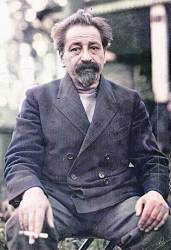
It seems he quite "hit it off" only in the People's Commissariat for Foreign Affairs where he was valued. In the other places he was not in tune, not fully in tune, or something of the sort. It was impossible to find work for him in Russia.
Shklovsky is a veteran Party man. As his letter shows, he feels extremely upset at "not being allowed" to work in Russia. He is nervous, fears that he is being "put off," etc.
He has a family and children (it's not easy to adapt oneself to cold and starving Russia). Both Zinoviev and Safarov and all those who were in Switzerland in 1908-1917 knew Shklovsky abroad.
Please write yourself or have your secretary write to Shklovsky (through Krestinsky in Berlin) asking what he would like, and then raise the question in the Secretariat. People should not be "squandered"; he should be given the closest attention.
With communist greetings,
Lenin

Russian source: The following information comes from the The Last Address parent website and its child webpage entitled, Moscow, Lyalin lane, 8, building 2. The three photographs accompanying this item also come from that webpage.
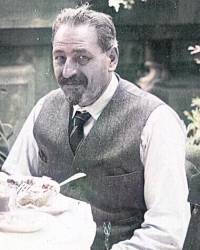
In 1924 Grigory Lvovich returned to Moscow and settled with his family in Lyalin Lane, 8, although he had been offered a new 7-room apartment on Romanov Lane for being an old and honoured Bolshevik.
"But he refused such an upscale apartment saying that it was too fancy for him, a modest man," Shklovsky's grandson Alexander Kisin wrote to us: "Instead of this apartment Grigory Lvovich occupied a more modest one on Lyalin Lane where I lived until 1961. From my mother's stories I know my grandfather did not break the Party maximum and always lived very modestly. My mother had only one dress which she wore to study at the university."
Shklovsky was active in Party work and at the Fourteenth Congress of the Communist Party [December 18-31, 1925] he was elected to the Central Control Commission.
However two years later he was expelled from it and from the Party "for working in the ranks of the Zinoviev-Trotskyist Opposition" [Fifteenth Party Congress, December 2-19, 1927].
In 1928 Shklovsky got a job in the Chemical Syndicate. In 1929-1930 he joined the board of "ChemImport" [a state-joint stock company under the People's Commissariat of Foreign and Internal Trade] and from 1931 the Association of Scientific and Technical Publications. He was also made deputy head of the All-Union Association of the Chemical and Pharmaceutical Industry.
He was arrested on the night of May 3-4, 1936, accused of belonging to a "counter-revolutionary Trotskyist organization."
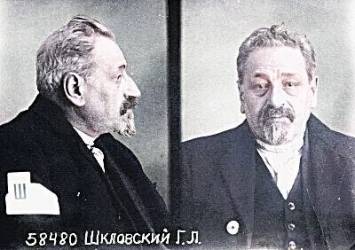
"My mother and father, my grandmother Dvosya Zelikovna Shklovskaya, her daughters Natalya and Evgeniya, and Natalya's husband Boris Maksovich Gurevich were present at the time of the arrest," writes Shklovsky's grandson Aleksandr Kisin.
"The Chekists found 1,000 Swedish krones and about US$1,800 during their search. When asked where the currency had come from, my grandfather replied that he had the right to answer the question before a Politburo meeting exclusively.
"The Chekists dumped into sacks what they had found—books, photographs, manuscripts, a briefcase with jewelry belonging to a certain acquaintance named Laurel—and left the apartment with their prisoner. No one saw him alive again.
"When Grigory Lvovich was arrested," continues Alexander Kisin, "the first thing that my grandmother did was to go see Nadezhda Konstantinovna Krupskaya [Lenin's widow] with whom the Shklovsky family had had very warm friendly relations in Bern. The two elderly women sat and cried, and Nadezhda Konstantinovna said sadly that she no longer had any chance of helping anyone now."
On November 14, 1936, Shklovsky was sentenced to 10 years hard labour under Articles 17-58-8 and 58-11 of the Criminal Code of the Russian Socialist Federative Soviet Republic.
He started serving his term in Solovki, but on October 10, 1937, a special troika of the N.K.V.D. for the Leningrad Region sentenced him to death and had him executed at the Sandarmokh tract on November 4, 1937. He was sixty-two years old.
Shklovsky's wife was also repressed. She was sentenced to five years hard labour. She served her term in Mordovia, in the Temnikov camps.
Shklovsky's case is reminiscent of Myasnikov's (Chapter 28, Item 7). Both returned to Russia and both wound up arrested and shot.
4. TO N. A. SEMASHKO.
28.II.1921
Comrade Semashko
Nikolai Alexandrovich:
I have now with me Comrade Ivan Afanasyevich Chekunov, a very interesting toiling peasant who is propagating communist principles in his own way.1
He has lost his spectacles and paid 15,000 rubles for the trash! Could you help him get good spectacles?
I earnestly request you to help and to ask your secretary to let me know if you have managed to do so.
Yours,
Lenin
5. TO N. OSINSKY.
1.III.1921
Comrade Osinsky:
Yesterday I saw Ivan Afanasyevich Chekunov.1
It turned out that he had already been to see me in 1919 on the question of a congress of toiling peasants. Now he says: it's better to start with regional ones.
He sympathizes with the Communists but will not join the Party because he goes to church and is a Christian (he says he rejects the ritual but is a believer). He has been improving his farm. He has toured Nizhni-Novgorod and Simbirsk gubernias. He says the peasants have lost confidence in the Soviet power. I asked him whether we could right things with a tax? He thinks we could.2
In his own uyezd he has succeeded with the help of the workers to substitute a bad Soviet authority with a good one. That's the kind of people we must do our utmost to hold onto, in order to restore the confidence of the peasant mass. This is the main political task and one which brooks no delay. My earnest request: see that the "apparatus" standpoint does not run away with you and do not worry too much over it. Devote more attention to the political attitude towards the peasantry.
I think we must "capture" Chekunov immediately, i.e., involve him in our activity. How are we to do this? This needs thinking about. Perhaps we should set up right away (rather start) a "toiling peasant council" or a "non-Party peasant council" (perhaps the latter name is more guarded for keeping out those whom Chekunov calls the "hissers," i.e., the downright kulaks and enemies of the Soviet power).
Chekunov should be appointed right away as the authorized representative of the People's Commissariat for Agriculture to build (or prepare) such an institution. He should be sent urgently to Simbirsk Gubernia (we need an adviser and a mediator from a gubernia with surplus grain; better two mediators) and be given this assignment: bring us over here from Simbirsk Gubernia (where he knows several people) a non-Party Russian peasant advanced in years, a farmer who favours the toiling peasants and the workers and is not a "hisser." Another one must also be found. Three would be best: Chekunov + the man from Simbirsk + another man from a gubernia not growing grain. It would be good for all of them to be both non-Party men and Christians. We will turn this trio of "old men" at once either into non-voting members of the collegium or into the nucleus of a "non-Party peasant council" or a similar corporation.
This must be done speedily, at once. He intends to leave the day after tomorrow.3
Strike while the iron's hot. Let me have your reply.
With communist greetings,
Lenin
2 I asked him whether we could right things with a tax? He thinks we could - Lenin posed the question on February 28, 1921. A week later the Tenth Party Congress opened (March 8-16, 1921). The Congress approved the replacement of the surplus-appropriation system by a tax in kind. "This turn from War Communism to the New Economic Policy is a striking instance of the wisdom and farsightedness of Lenin's policy" (J. V. Stalin. History of the Communist Party of the Soviet Union, p. 256).
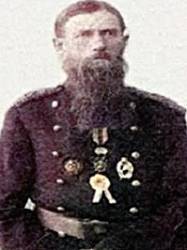
3 Ivan Afanasyevich Chekunov (1861-1929) was born in the Russian town of Fominki, 350 kilometers east of Moscow. Today its population is 1,305 inhabitants, part of Vladimir Oblast. The year of Chekunov's birth, 1861, was the year of the abolition of serfdom.
Ivan Chekunov owned not only a house with buildings and a plot of land but also a large two-story tavern with eleven windows along the façade. There he served tea, rolls, vodka, wine, cabbage soup, herring and sausages. Drunkards were not welcome. After the introduction of the state monopoly on alcohol, Chekunov converted the tavern into a tea house of the Guardianship of People's Sobriety.
In those days of yore disastrous fires were a frequent occurrence. One such fire burned down half the village. In July 1898 Ivan Afanasyevich, his brother Alexei and Bakhtov the merchant started a "Volunteer Fire Brigade" made up of volunteer villagers. They would meet in Chekunov's tavern after their daily cores and practise fire drills on weekends. Initially a fund of 1,500 rubles (a lot of money then) was collected to equip the fire brigade. Next a firehouse was built in 1903 with everybody's donations. The firemen, numbering four hundred in total, doubled as masons and built a brick look-out tower on the highest spot in the middle of the village beside a vast year-round pond. The station stowed the firefighting gear and had a stable for the fire horses.
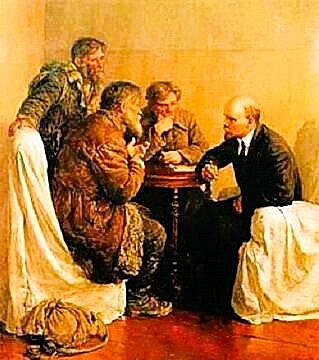
The fire station doubled as a House of Culture in the early 1900s. In 1903 the teachers and students of Fominki started an amateur folk theater. And so the fire department turned into...a theater!
Fominki's firefighters occupy the same station (albeit restored).
Chekunov met Lenin for the second time on February 28, 1921, and handed him the minutes of a general meeting of Fominki citizens on the question of levying a meat tax. That meeting had resolved to keep one cow per five consumers and to leave the surplus for the food detachments.
Ivan Chekunov believed in God but when the local priest called to wrest the Motherland from the Bolsheviks, Ivan got sixty-three believers to sign the statement, "The Motherland does not perish," and sent the declaration to the Vladimir Gubernia newspaper, Voice of the People.
Chekunov was summoned to Moscow. He was invited to State Planning Commission meetings, became a member of the Board of the People's Commissariat for Agriculture. Toward the end of his life he became head of the Letters Department in the Peasant Newspaper and contributed to Pravda, Bednota and Izvestia articles about advanced farming techniques for neophyte collective farmers.
The indefatigable Russian who had once been labeled, "the tavern worker" or "the hard worker" or "the experimenter" and "the Lenin walker" (i.e., the lobbyist) passed away in the first days of the year 1929.
Russian source: Love Is Unconditional and its child webpage entitled, Ivan Afanasyevich Chekunov. Accessed Friday February 18, 2022.
6. TO A. A. JOFFE.
17.III.1921
Dear Comrade Joffe:
I was highly distressed to read your deeply perturbed letter of March 15.1 I see that you have the most legitimate grounds for dissatisfaction and even indignation, but I assure you that you misidentify the causes.
First, you are wrong in saying (repeatedly) that "I [Lenin] am the Central Committee." This could have been written only in a state of great nervous irritation and overwork. The old Central Committee (1919-1920) defeated me on one of the vastly important questions, as you must know from the discussion.2
I cannot say how many times I have been in a minority on organizational and personal matters. You must have seen this for yourself on many occasions as a Central Committee member.
You should not allow yourself to be so nervous as to write such an absolutely impossible, absolutely impossible statement that I am the Central Committee. This is overwork.
Second, I do not feel the slightest dissatisfaction with you or mistrust you in any way. Nor do the members of the Central Committee as far as I know. I have talked with them and seen their attitude towards you.
What's the explanation then? The explanation is that you have been tossed about by fate. I have seen it happen to many workers. Take Stalin for example. Surely you know that he would have stood up for himself, but "fate" did not let him be once in three and a half years either People's Commissar for the Workers' and Peasants' Inspection or People's Commissar for Nationalities. That's a fact.
[...]
7. CERTIFICATE TO A. R. SHAPOSHNIKOV.
This is to certify that Alexei Romanovich Shaposhnikov, a peasant of Beketovo Village, Bulgakovo Volost, Ufa Uyezd, Ufa Gubernia, was summoned by me to Moscow for discussion of and consultation on an important matter relating to the peasant economy.1
Citizen A. R. Shaposhnikov has been honest and scrupulous in his explanations and replies.
All Soviet authorities of the Russian Socialist Federative Soviet Republic are hereby requested to help citizen A. R. Shaposhnikov in every possible way return to peaceful labour at his domicile.
V. Ulyanov (Lenin)
Chairman, Council of People's Commissars
8. TO V. M. MOLOTOV.
Comrade Molotov:
Unless my memory fails me, I believe the newspapers carried a Central Committee letter or circular about May Day which said: expose the falsehood of religion or something to that effect.
That's not right. It's tactless. Just because it's the Easter holiday we should recommend something quite different:
Not "to expose the falsehood" but to absolutely avoid any affront to religion.
We should issue an additional letter or circular.1 If the Secretariat does not agree, then in the Politburo.
Lenin
9. TO J. S. HANECKI.
25.IV.1921
Comrade Hanecki:
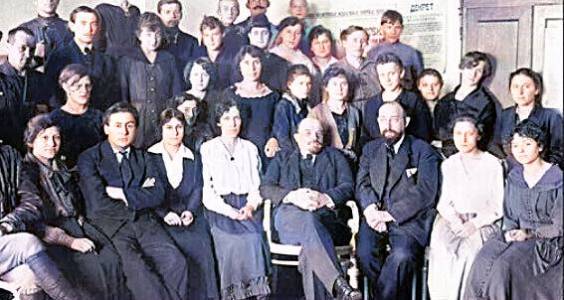
Two of my secretaries are going to see you in Riga:
1) Anna Petrovna Kizas.1
2) Natalya Stepanovna Lepeshinskaya.2
I have worked with both for several years. They are remarkably loyal.
Working for me has been hard labour. No rest or holiday. They are quite tired out. They must be given a rest.
Please pay their salary in advance (and give them extra) and then don't make them work. Give them a chance to rest, to see the doctor and to have some wholesome food.3
Greetings,
Yours,
Lenin
10. TO N. P. GORBUNOV.
26.IV.1921
Comrade Gorbunov:
I must call your attention to the extreme disorder in our office. The attached telephone message was sent out on 24/IV (hour?) and received at 11.25 on 25.IV (i.e., it took 11 hours to transit!).
I received it at 12.00 on 26/IV.
This is most outrageous!
I propose that you should conduct a full and thorough investigation right away to find out who is to blame, and give me the facts. The office routine should be reviewed and renewed.
V. Ulyanov (Lenin)
Chairman, C.P.C.
11. TELEGRAM TO G. K. ORJONIKIDZE.1
Send at once by direct line
Orjonikidze
Baku
Serebrovsky [Chapter 29, Item 6, footnote 1] should not take offence at the tone of my telegram: I was worried over the future of Baku. I consider Serebrovsky a most valuable worker. I demand that you keep me supplied with exact information about the results of the work in improving the oil industry in Baku and also about the results of foreign trade operations.
Let Serebrovsky see this telegram.
Lenin
Chairman, C.L.D. [Council of Labour and Defence]
12. TELEPHONE MESSAGE TO A. I. RYKOV.
Send the following telephone message to Rykov:
(Copy to Smolyaninov)
I consider quite right your decision to authorize the People's Commissariat for Food to set up a special shop (store) for the sale of foodstuffs (and other items) to foreigners and to Comintern visitors.
I propose that it should be passed through the C.L.D. and expedited in every way.1
The shop should be run along strictly commercial lines with an individual manager. Purchases at the shop should be allowed only to those who arrive from abroad and present their special identity and consumer cards. I assign Smolyaninov to keep a special check on this matter.
Lenin
13. TO THE NARROW COUNCIL OF PEOPLE'S COMMISSARS.1
Our houses are terribly fouled up. The law is not worth a damn. There must be tenfold more precise and fuller indication of the persons responsible (not one but many, one after the other) and remorseless incarceration.
14. TO MAXIM GORKY.
9/VIII.1921
I have forwarded your letter to L. B. Kamenev.1
I am so tired that I am unable to do a thing.
Just think, you have been spitting blood, but refuse to go!! This is truly most shameless and unreasonable on your part.
In a good sanatorium in Europe you would receive treatment and also do three times as much useful work.
Really and truly.
Over here you have neither treatment nor work—nothing but hustle. Plain empty hustle.
Go away and recover. I beg you not to be stubborn.
Yours,
Lenin
15. TO N. P. GORBUNOV.
We should learn to track down and punish unintentional red tape because you can never catch the "deliberate" one.1
Lenin
11.IX
16. BUGUN FISHERMEN'S AND WORKERS' SOVIET OF THE NORTHERN COAST, ARAL SEA.
To Comrades Workers, Fishermen of the Aral Sea
THE ARAL SEA |
|
Soviet documentary (1963) |
French documentary (2024) |
Source: Yuri Gerasimov |
Source: FRANCE 24 English |
Dear Comrades:
You must have heard by now about the great disaster, the unprecedented famine that has hit the whole of the Volga region and part of the area west of the Urals. The drought has almost entirely scorched the cereals and the grasses everywhere from Astrakhan Gubernia all the way up to the Tatar Republic and Perm Gubernia. Millions of toiling peasants and workers and millions of heads of cattle are dying or about to die. Russian, Moslem, nomad, settler, all are equally faced with cruel death unless help comes from their comrades the workers, the toiling peasants, the shepherds and fishermen of the more prosperous regions.
Of course the Soviet power, for its part, hastens to aid the starving. It has already sent urgently more than twelve million poods of grain for the winter sowing and is currently sending food, organizing eateries, etc. But all this is not enough.
The disaster is so great and the Soviet Republic so ruined by the tsarist war and the whiteguards that hardly a quarter of the needy masses can be fed from the state's resources somehow until the next harvest.
Nor can we expect assistance from the wealthy capitalists. It's true that the capitalists who currently govern the strongest states of the world like Britain, America and France have told us that they want to help our starving peasants (allegedly) but on terms tantamount to handing our Workers' and Peasants' Republic over to them. Surely we can all understand this. Has any bloodsucker, capitalist and usurer, ever helped a toiler without expecting something in return? The capitalist class has always used the toiling man's hunger to enslave him, body and soul. Now they want to take advantage of our famine to abolish the freedom we have won at the price of our blood, to wrest power from the workers and peasants forever and to saddle them once more with the tsar, the landowner, the master, the police officer and the official.
The only hope for those starving in Kazan, Ufa, Samara and Astrakhan lies in the great proletarian solidarity (sympathy) of men like themselves with toil-hardened hands who earn their daily bread with hard work without sucking anyone's blood.
You enjoy a good catch of fish on the Aral Sea and you will be able to live placidly. So please set aside part of your catch for the old men and women bloated by starvation, for the eight million exhausted toilers who will perforce do the heavy chore of tilling the land on an empty stomach for almost a year, and finally for the seven million children who may be the first to die.
Dear comrades, fishermen and workers of the Aral Sea, I urge you to give with a generous hand! In so doing you will not only be acting in human conscience, you will be strengthening the cause of the working-class revolution for you will demonstrate to the whole world and, above all, to all the working people the invincible might of the Soviet workers' state built upon the mutual assistance of proletarians even dwelling far apart.
Let the whole working class rise as a man to heal this deep wound in the Volga region, and the fertile Volga region will repay us with its grain in future years. That's our only way to preserve the Soviet power and to safeguard the freedom we have won against all the villainous attempts of the world's capitalists.
V. Ulyanov (Lenin)
Chairman, Council of People's Commissars
17. TO G. M. KRZHIZHANOVSKY.
G. M.1:
Return this if you approve, and I shall have it retyped and sent (to whom? to you?).
I wonder whether it's worth doing this at all? Perhaps this is unnecessary "pomp"? Is it of any practical benefit? 2
Lenin
This is what his letter said,
I regret very much that I am unable to greet your Congress in person.
I have on more than one occasion expressed my opinion about the importance of the book, A Plan for Electrification, and more so about electrification itself. Large-scale machine industry and its extension to agriculture is the only possible economic basis for socialism, the only possible basis for a successful struggle to deliver mankind from the yoke of capital, to save mankind from the slaughter and mutilation of tens of millions of people ordained to decide whether British, German, Japanese, American, etc., vultures are to have the advantage in dividing up the world.
The Workers' and Peasants' Soviet Republic has initiated the planned and systematic electrification of the country. However meagre and modest the beginnings may be, however enormous the difficulties facing the country which landowners and capitalists reduced to ruin during four years of imperialist war and three of civil war and which the bourgeoisie of the whole world is watching ready to pounce upon and colonize, however slow, painfully slow, the electrification of our country may proceed, progress is being made nevertheless.
With the assistance of your Congress, with the assistance of all the electrical engineers of Russia and a number of the best and progressive scientists around the world, by the heroic efforts of the vanguard of the workers and toiling peasants, we shall cope with this task and our country will be electrified.
I greet the Eighth All-Russia Congress of Electrical Engineers and wish you every success.
18. TELEGRAM TO ALL GUBERNIA EXECUTIVE COMMITTEES, GUBERNIA PARTY COMMITTEES, GUBERNIA TRADE UNION COUNCILS, GUBERNIA LABOUR COMMITTEES.1
Under the influence of the food supply situation in the Donbas, which was aggravated last May-July, tens of thousands of workers have abandoned the pits and dispersed, some beyond the region's boundaries. The flight is especially strong among coal-hewers, whose numbers dropped from 16,000 to 10,000 in August, and also among skilled boiler-men.
The food supply situation in the Donbas has now stabilized; a three months' supply of grain has been delivered and is to be increased. I propose that you start widespread agitation for a return to the pits by the coal-hewers, sledders, timberers, drillers, drifters, haulers, boiler-men and machinists who left Donbas. No need to send workers outside the stated professions.
In conducting the agitation explain: 1) there is full provision of grain; 2) the new remuneration scales in food and cash are based on productivity; uniform scales abolished; 3) the success of the food campaign in the Ukraine depends largely on a return of the workers because the campaign is hampered by a shortage of fuel [coal] for transportation [railway steam engines].
Lenin
Chairman, C.L.D. [Council of Labour and Defence]
19. TO V. M. MOLOTOV FOR MEMBERS OF THE POLITBURO.
Received after Politburo sitting.
Please circulate urgently to all members
of Politburo for a written vote
10.X.
Comrade Molotov:
I have arranged with Comrade Unschlicht a delay in the execution of Nazvanov.1,2 I am taking the matter to the Politburo.
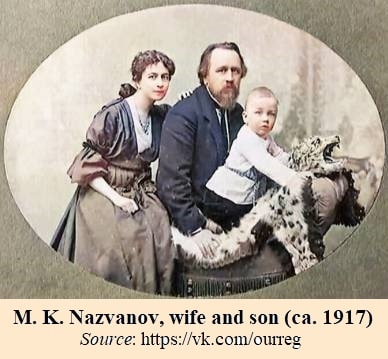
In the summer of 1921 I had a letter about Nazvanov from Krasin (before Nazvanov's arrest). Krasin requested that this very valuable engineer, as he put it, should be recruited for our work.
Krzhizhanovsky told me that he had sharp arguments with Nazvanov repeatedly after 25.X.1917 and very nearly had thrown him out of the house for his anti-Soviet views. However he said that in the spring or summer of 1921 he noticed a change in Nazvanov and had taken him to work at the State Planning Commission.
After this I had two comrades from the sugar industry workers' central committee who, in reply to my question, gave a positive opinion of Nazvanov, an opinion they restated in writing. On the strength of the aforementioned I am taking the matter to the Politburo.
I propose: if necessary, Krasin's letter and a written reference of the two workers should be found. I shall find them if the Politbureau asks to see them.
For my part I propose: to cancel the Petrograd Gubernia Cheka's sentence and to apply the one proposed by Agranov (it's here in the case's transcript), i.e., two years with the possibility of conditional release.
With communist greetings,
Lenin
20. TO THE POLITBURO.
I consider the matter of exceptional importance and urgency because to conclude a loan with Italy, which is not demanding recognition of the old debts, might mean a break through the financial blockade.1
[...]
21. TO ARMAND HAMMER.
3.XI.1921
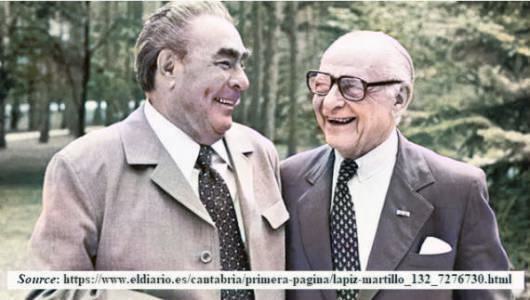
Dear Mr. Armand Hammer!
Comrade Reinstein tells me that you are leaving Moscow tonight. I am very sorry that I am occupied at the session of the Central Committee of our Party. I am extremely sorry that I am unable to see you once more and greet you.
Please be so kind [as to] greet your father [on my behalf] and also the best comrades [presently] in American gaols: Jim Larkin, Ruthenberg and Ferguson. My best sympathy and best wishes to all them.
Once more best greetings to you and your friends in connection with flour for our workers and your concession. The beginning is extremely important. I hope it will be the beginning of extreme importance.
With best wishes,
Yours truly,
Lenin
P.S. I beg to apologize for my extremely bad English.
22. TO V. I. SAMARIN.
Comrade Samarin:
I have been informed by absolutely honest people who have been to the Crimea that everyone there is stealing wine.1 They say the situation is utterly scandalous with bribe-taking and hard drinking.
You are responsible for a full and impartial check-up.
RE: the controversy between the People's Commissariat for Foreign Trade and the People's Commissariat for Public Health on whether wine should be sold abroad (I think this ought to be done fast) or be saved for hospitals. You must collect all the facts on this question quickly.
If there is anything urgent, cable me directly.
I shall expect very brief dispatches weekly.
V. Ulyanov (Lenin)
Chairman, C.P.C.
23. TO THE PEOPLE'S COMMISSARIAT FOR FOREIGN TRADE.
To the P.C.F.T.
Copy to inform Comrade Pyatakov
I propose that we order foreign catalogues (German, American, British) for the Central Board of the Coal Industry of the Donets Basin merchandising:
a) mining equipment in general,
b) wire rope,
c) pumps,
d) electrotechnical materials,
e) coal-cutters, conveyers, etc.,
f) tools,
g) metal articles in general and wire in particular.
Please send a report upon execution to Comrade Gorbunov, C.P.C. business manager.
Chairman, Council of People's Commissars
24. TO THE FOREIGN LITERATURE COMMITTEE.
Forlitcom
Copy to Comrade Pyatakov
for information and co-ordinating with Forlitcom
the question of allocating the necessary credit
in gold for periodical subscriptions
I propose for the Central Board of the Coal Industry of the Donets Basin, charged to its account,
1) urgent subscriptions to all the sets of mining magazines (German, British and American) covering the period 1917-1921;
2) regular subscriptions by the Central Board to:
a) all mining magazines published in German, French and English;
b) new publications of the most important books on mining;
c) The Economist magazine.1
Please send a report upon execution to C.P.C. business manager Comrade Gorbunov.
Chairman, Council of People's Commissars
25. TO MAXIM GORKY.
6/XII.
Dear A. M.:
I am very sorry to write in haste. I am terribly tired. I've got insomnia. I am going away for treatment.
I have been requested to write to you: would you write to Bernard Shaw asking him to go to America, and to Wells who is said to be in America now, to get them both to help us in collecting aid for the starving?
It would be a good thing if you wrote to them.
The starving will then get a bit more.
The famine is very bad.
Make sure to have a good rest and better treatment.1,2
Regards,
Lenin
26. TO P. A. ZALUTSKY AND A. A. SOLTS.
Comrade Zalutsky and Comrade Solts:
I have learned about the expulsion of Nadezhda Sergeyevna Alliluyeva from the Party.
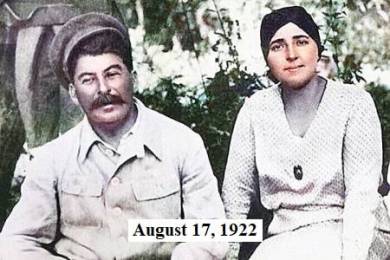
I have personally seen her work as a secretary of the Council of People's Commissars' Managing Department, i.e., at very close range. However I consider it necessary to point out that I have known the whole Alliluyev family, i.e., the father, the mother and the two daughters, since before the October Revolution.
In particular during the July days when Zinoviev and I had to hide out and the danger was very great this family hid me and the four of them [father, mother, two daughters]. They enjoyed the complete confidence of Party Bolsheviks then. They not only gave both of us [Zinoviev and Lenin] asylum but also rendered a number of secret services without which we would not have been able to elude Kerensky's bloodhounds.
It may very well be that this circumstance was not made known to the commission in view of Nadezhda Sergeyevna Alliluyeva's youth [born in 1901 in Baku].
Nor do I know if the commission examining the case of Nadezhda Sergeyevna Alliluyeva vetted the facts about her father. He assisted the Party in various capacities long before the Revolution and, so I heard, rendered important services to the illegal Bolsheviks under tsarism.
I consider it my duty to inform the Central Commission For Purging The Party of these circumstances.1,2
20.00 hours, December 20, 1921.
Lenin
27. TO I. S. UNSCHLICHT AND V. V. FOMIN.
16.I.1922
Personal
Secret
Comrade Unschlicht, All-Russia Cheka
and Comrade Fomin [Russian Wikipedia biography], People's Commissariat for Railways
Copy to N. P. Gorbunov
A few days ago I had occasion to see for myself the state of the All-Russia Cheka railway trolleys, which are apparently in the joint charge of the All-Russia Cheka and the People's Commissariat for Railways.
I think that railway trolleys are absolutely indispensable for the All-Russia Cheka (I have heard that they have two) and for the People's Commissariat for Defence at the Moscow Junction for very fast assignments, for highly urgent and highly secret dispatch of small detachments (5-10 men), etc.
I found the railway trolleys to be in the worst possible condition. I saw utter neglect, semi-ruin (very many things have been stolen!), total disorder; the fuel appears to have been stolen; there is water in the kerosene; the engine running excruciatingly rough, stoppages every minute along the way; the traffic wretched; station delays, station-masters completely unaware (apparently without any idea at all that the All-Russia Cheka trolleys should have special travel warrants and should go through at top speed, not in the sense of a running speed—these machines are apparently "Soviet," i.e., very bad ones—but in the sense of minimum delays and shortest waste of time; they should go through with military precision).
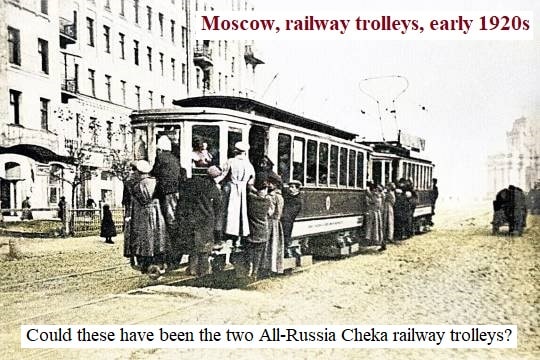
There is chaos, slovenliness and absolute disgrace.
Fortunately sitting incognito, I could overhear and heard the frank and honest talk of officials (not the honeyed and deceptive variety) and I gathered from their conversation that this experience was not unusual but the whole organization was incredibly disgraceful with complete dislocation and clumsiness.
This was the first time that I had travelled along the railway lines not as a "dignitary" getting all and sundry to hustle with dozens of special telegrams but as an unknown rider travelling with All-Russia Cheka men. My impression was one of depressing hopelessness.
If such is the state of a special small gear in the mechanism under the special supervision of the All-Russia Cheka itself, I can well imagine what the state of things in the People's Commissariat for Railways as a whole must be! The disorder there must be unbelievable.
I propose: to appoint at once by joint agreement between the All-Russia Cheka and the People's Commissariat for Railways (perhaps also getting the People's Commissariat for Defence involved if it has any trolleys?) a responsible individual close to the rails (not some distant high-ranking official) who will act as the supervisor and be held strictly responsible for any negligence.
Issue a short military-style set of instructions about the All-Russia Cheka trolleys, about their secret and swift deployments, maintenance in good repair, fuel storage, unfettered traffic along the Circular Road, the junction and everywhere, etc., etc. Add to these instructions, by the way, that at the request of N. P. Gorbunov (who will be doing this only with my consent) a railway trolley is to be made available promptly and run to the place he designates.
Send a detailed report upon execution to N. P. Gorbunov, C.P.C. business manager.
I also authorize Gorbunov to verify performance from time to time, i.e., to make unannounced trips on the railway trolleys, jotting down the minutes required for each operation (summons, running time, stops, etc.) and inspection.1
V. Ulyanov (Lenin)
Chairman, C.L.D. [Council of Labour and Defence]
28. TO V. M. MOLOTOV FOR MEMBERS OF THE POLITBURO.
To Comrade Molotov
for Politburo members
I quite agree with Trotsky.1
I propose:
1) Radek should be censured for giving in to the Mensheviks.
2) The reprisals against the Mensheviks should be intensified, and our courts should be instructed to intensify them.
3) Accept this proposal of Trotsky's.
4) Authorize Trotsky to accelerate in every way a fierce attack on the Mensheviks over Georgia.2
30/I.1922. Lenin
29. TO I. S. UNSCHLICHT.
31/I.
Comrade Unschlicht:
I am quite unable to be in the Politburo. I am feeling worse.
I believe you can do without me.
The whole point now is the purely technical measures leading to our courts intensifying (and accelerating) reprisals against the Mensheviks.
Both the courts and the Council of People's Commissars or the All-Russia Central Executive Committee.
With communist greetings,
Lenin
30. LETTER TO G. V. CHICHERIN AND ASSIGNMENT TO SECRETARIES.
Please show Stalin and Molotov, and forward to Chicherin, this reply of mine:
Comrade Chicherin!
You are letting your nerves run away with you. We shall still have time on 22 or 23/II to discuss the plan of conduct at Genoa.
You and I have both fought against pacifism as a programme for the revolutionary proletarian party. That much is clear. But who has ever rejected the use of pacifists by that party to soften up the enemy, the bourgeoisie? 1
Yours,
Lenin
31. TO A. I. RYKOV AND A. D. TSYURUPA.
April 12, 1922
I request you to call a conference of deputy commissars this very day to work out practical and most vigorous measures for getting the Kashira Station to start supplying electricity to Moscow. It is quite an intolerable outrage when a fit station with all the transmission lines strung up is unable to supply electricity because of our administrative muddle.1
Lenin
32. TO P. M. KERZHENTSEV.
13.IV.1922
Comrade Kerzhentsev:
It is my earnest request that you show the fullest trust in and give every assistance to Comrade Béla Kun 1 and his family for settling in Stockholm and obtaining rest and treatment (which he very much needs) and everything else.
Best regards!
Yours,
Lenin
It is known that Bela Kun, a Hungarian Jew, communist and the leader of internationalist units during the civil war walked at the very top of the Kremlin. And so, after the Reds occupied Crimea, he arrived there to carry out the most brutal terror. Before leaving for Crimea, Bela Kun declared cynically: "Comrade Trotsky said that he would not go to Crimea as long as there was still one White Guard living there."
Bela Kun the supreme leader of terror in Crimea and his partner Zemlyachka shot more than one hundred thousand (!) former servicemen (Whites) who were initially "granted amnesty." Execution lists were compiled but were insufficient, so Bela Kun the "wit" ordered all, all, all former servicemen to register "for labor service" under a threat of execution. And it was according to these "labor service" lists that Bela Kun and Zemlyachka carried out their extermination. Only a few who did not register and managed to leave Crimea survived.
33. TO BÉLA KUN.
Dear Comrade Béla Kun:
I enclose herewith letters to Kerzhentsev and Smirnov. I have written to Karakhan. If you need anything else, please write me at once (at Fotieva's address).
Best regards!
Yours,
Lenin
34. TO G. Y. ZINOVIEV.
Comrade Zinoviev
Top secret
Not to be retyped
Comrade Zinoviev:
Please raise at the Executive Committee of the Comintern (I am not sure whether it should be an enlarged sitting or a sitting of the Narrow Bureau) the issue of sending one or several special Comintern correspondents to South Africa to gather the most detailed information and the fullest set of local literature, legal and illegal, which relates to the recently suppressed workers' uprising.1
This should be done as soon as possible and with the maximum precautions because the British are sure [to do everything] to curtail the slightest possibility of any contact between us and the insurgents who have not yet been shot or jailed.
For our part we should establish at all costs the rule that Comintern agents should endeavour to put in a secret appearance at all places where such uprisings occur and make a timely compilation of the fullest material on the uprising's history.
Please reply in a couple of words.
Lenin
35. TO G. Y. ZINOVIEV.
1
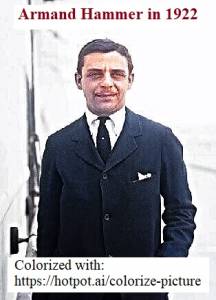
11.V.1922
Comrade Zinoviev or his deputy
Petrograd
To Comrade Zinoviev
(to Comrade Zinoviev or his deputy)
I beg You to help the comrade Armand Hammer; it is extremely important for us that his first concession be a full success.
Yours,
Lenin
I beg you to give every assistance to the bearer, Comrade Armand Hammer, an American comrade who has taken out the first concession. It is extremely, extremely important that his whole undertaking be a complete success.
With communist greetings,
V. Ulyanov (Lenin)
2
Telephone message for Zinoviev and his deputy in Petrograd 1 (make sure this is not lost in the event of Zinoviev's departure or absence)
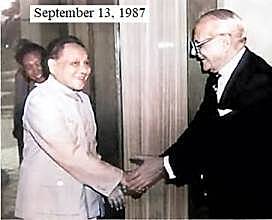
Today I wrote a letter of reference to you and your deputy on behalf of the American Comrade Armand Hammer. His father is a millionaire and a Communist (he is in prison in America). He has taken out our first concession, which is very advantageous for us. He is going to Petrograd to be present at the discharge of the first wheat ship and to arrange the receipt of machinery for his concession (asbestos mines).
It is my earnest request that you issue orders at once to see that there is no red tape and that reliable comrades supervise the progress and speed of all operations for this concession. This is of the utmost importance. Armand Hammer is travelling with the director of his company, Mr. Mishell.2
Lenin
36. TELEGRAM TO L. B. KRASIN, G. V. CHICHERIN AND V. V. VOROVSKY.
Krasin, Chicherin and Vorovsky
Genoa
I attach enormous importance to such a treaty. I think we should offer the Italians a coal price lower than their usual suppliers'. Please speed up your reply.
Lenin
37. TO N. I. BUKHARIN.
7/IX.1922
Comrade Bukharin:
I have read Gorky's vile letter in Sotsialistichesky Vestnik.1
At first I thought of attacking him in the press (over the Socialist-Revolutionaries) but then decided this would be too much. Let us consult about this. Perhaps you see him now and then and talk with him?
Please write me your opinion. I have seen few newspapers (almost no foreign ones) which means that I have scant knowledge of the "situation." Write me your opinion in the greatest possible detail.
Best regards from all of us to your wife and yourself.
Yours,
Lenin
P.S. I am almost well.
P.S. I am writing to Krestinsky to get me the original of Gorky's letter published in the Sotsialistichesky Vestnik number of 20/VII.1922.
If he forgets, will you send it along.
38. TO THE CHAIRMAN OF THE PERM GUBERNIA EXECUTIVE COMMITTEE.
October 20, 1922
The American tractor team led by Comrade Harold Ware 1 in Okhansk Uyezd on the territory of Perm Gubernia has achieved considerable results despite having been working only for a short time. Altogether up to 1,500 dessiatines have been ploughed with almost 1,000 sown to winter grain crops. But for the usual drawbacks in our ways and means, the American team would undoubtedly have achieved even greater results.
Your report mentions a shortage of gasoline, lubricating oil and construction workers but says nothing about what the Gubernia Executive Committee has done to straighten things out.
It's absolutely intolerable that such a useful undertaking does not enjoy every possible assistance especially by the local organizations which are in a better position to analyze impairments and to help remove them.
Please give the maximum assistance to this group and in particular help to implement their proposals for an efficient use of tractors, the adequate supply of gasoline, the building of a repair shop, the construction of housing, etc.
The support of the American agricultural teams is most desirable and timely. Our main task in all this is to help them carry out their ideas with the least possible delay.
Please inform me through Comrade Smolyaninov about the results of your measures and also about any specially pressing needs you are currently unable to meet.
V. Ulyanov (Lenin)
Chairman, Council of People's Commissars
39. TO THE PRESIDIUM OF THE ALL-RUSSIA CENTRAL EXECUTIVE COMMITTEE.
24/X.1922
A number of newspaper articles have noted the absolutely extraordinary success scored by some American agricultural communes and teams who brought over their tractors with them. A special check-up has verified that excellent work has been done by the tractor team led by Harold Ware at Toikino State Farm, Perm Gubernia. Additionally the Industrial Immigration Department of the Supreme Economic Council possesses similar information concerning the work of agricultural communes in Kirsanov Uyezd, Tambov Gubernia, and in the village of Migayevo, Tiraspol Uyezd, Odessa Gubernia.
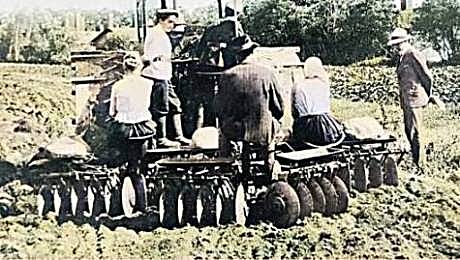
The American Society for Technical Aid to Soviet Russia is currently preparing nearly 200 artels with 800-1,000 tractors for dispatch to Russia. If this goes through we shall have at least one model farm with American machinery per uyezd. I take this to be of great importance.
With the object of abetting this undertaking, I have written letters of gratitude to the American Society of Friends of Soviet Russia and to the American Society for Technical Aid to Soviet Russia, telling them that no form of aid is as important or as timely for us as the one they are providing to our agriculture.
In these letters I said that I was sending a recommendation to the Presidium of the All-Russia Central Executive Committee to declare as model farms the Perm and other leading trial experiments and to accord them special and extraordinary assistance both in respect of construction projects and of supplying gasoline, metal and other materials needed for future operations and for building repair shops.
Please consider this question and grant my request.1,2
V. Ulyanov (Lenin)
Chairman, Council of People's Commissars>
40. TO G. V. CHICHERIN.
Comrade Chicherin!
Perhaps we should kick at Mussolini, have everyone (Vorovsky and the whole delegation) leave Italy and begin to attack her over her Fascists?
Let us stage an international demonstration.
This provides a very convenient pretext: you have beaten our men, you are barbarians, diehards worse than those of Russia in 1905, etc., etc.1,2
I think we should do this.
Let us give the Italian people some serious help.3
Yours,
Lenin
41. TO J. V. STALIN.
Top secret
Personal
Copy to Comrades Kamenev and Zinoviev
Dear Comrade Stalin:
You have been so rude as to summon my wife to the telephone and use gross language. Although she had told you that she was willing to forget this, the fact nevertheless became known through her to Zinoviev and Kamenev.
I have no intention of forgetting what has been done against me so easily, and it goes without saying that what was done against my wife I consider it done against me as well. I ask you therefore to ponder whether you are prepared to retract what you said and to make your apologies or whether you prefer to break off relations between us.1
Respectfully yours,
Lenin
March 5, 1923
42. TO P. G. MDIVANI, F. Y. MAKHARADZE AND OTHERS.
Top secret
Comrades Mdivani, Makharadze and others
Copy to Comrades Trotsky and Kamenev
Dear Comrades:
I am following your case with all my heart. I am indignant over Orjonikidze's rudeness and over the connivance of Stalin and Dzerzhinsky. I am preparing notes and a speech for you.1
Respectfully yours,
Lenin
43. HORRENDOUS SITUATION OF THE CHILDREN IN RUSSIA?
| USSR Central Television 1967 Documentary: Chronicle of Half A Century | |
|
Year 1923 |
Year 1924 |
With Germany defeated anew by France after the decree scrapping passive resistance, the Ruhr takes a back seat on the world's agenda to the revolution forecast for Germany. But whom will that revolution benefit? Telegrams allot greater importance to the nationalist movement than they do the communist one, and yet...
In Germany today Communism has built up great strength in the span of a few months and, above all, it is backed by Russia. But the communists can not triumph on their own so they seek dialogue with the other aggressive force, the nationalists, adducing that Communism may not only be the sole viable option but also the way to upset France.
The communists say:
Triumphant nationalism would have fifteen million unionized workers arrayed against it. With the workers' hostility the nationalists can not wage war or resist France. On the other hand Communism could win the support of nationalists because it would halt France's collection of public debts as these would be annulled as they were in Russia; and France would be unable to occupy Germany or force fifteen million workers to do her bidding. Moreover the implantation of Communism would bring about an economic and military alliance with Russia.
What will win out in the nationalist camp? Its patriotism or its conservative conscience? If they sensed viability in Communism they would accept the pact with the communists but they fear a deepening of the German chaos. According to the latest telegrams Ludendorff is dead set against conciliation with Bolshevik sympathizers. If this is true, nationalists and communists will strive for power separately. That's why we are already seeing the Bavarians arming while the communists for their part declare the continuation of passive resistance in the Ruhr.
Germany has not faced a crisis like the present one since November 1918. But that crisis will not affect Germany alone. Whatever force triumphs will influence the world and Spain, always set against the possible spread of working-class extremism.
A Berlin clinic for nervous system disorders is treating Yakovlev the Bolshevik commissar who entered History for having executed the entire imperial family of Russia. The former horologist described in a press conference how the horrible scene unfolded. He entered the chamber of the Czars, who were in the company of their children, and he read outloud the edict sentencing them to death. Then he ushered in six Red soldiers. The Czar and his sickly child were killed in the first volley. The Empress, kneeling and praying, was killed with a blow from Yakovlev`s revolver to her nape. The Grand Duchesses were bayoneted to death. After reading his account we will not wonder why the Bolshevik commissar suffers flashbacks.
"Slovo" the Russian editorial house located in another borough of the German capital has just published the Diary of the Emperor of Russia (Dnevnik Imperatora Nikolaya II). Czar Nicholas II was in the daily habit of jotting down events of greater importance, or a least, those that seemed to him vitally important. The Diary corroborates what we already knew about the tragic Czar from the Memoirs of his collaborators like Count Witte or from the reminiscences of foreign statesmen like ambassadors Buchanan, Paléologue, etc. In short, Nicholas Romanov was an excellent husband and an excellent father, but a man of too weak a character to reign over the world's biggest Empire. Upon reading his Diary one could say that he had no inkling of the anarchist movement or the defeat of his Army at the hands of the Japanese or the Revolution of 1905. One could say that he lived on another planet. He only cared for his family and his fondest wish was to retire to his possessions of Livadia (Crimea) and live surrounded by its flowers, his wife and his children.
[...]
Madrid, 5: Incoming dispatches say that three Spanish subjects detained in Russia who were the object of ill treatment have been released thanks to the continual efforts of the Spanish ambassador in Berlin.
Paris: The Tribunal of Lausanne is hearing the case of Conradi, a former Russian official of Swiss origin, who last May murdered Vorovsky the official representative of the Soviet government and wounded two of his aides. Upon being questioned Conradi told the Tribunal that ever since he had learned about the martyrdom inflicted on his parents in Russia he had vowed to take revenge on the first Bolshevik official he came across.
More than fifteen thousand forsaken children, orphans without roof to snuggle under, without food, wander over the streets of Moscow. They hail from all points of the jaded Soviet empire. Dozens perish daily from hunger and cold; between sixteen to twenty a day conclude their miserly life under the wheels of railway trolleys and automobiles, and it's not strange to see lying in the snow and mud their mutilated and bloodied small bodies, and despite this, they keep arriving in Moscow by the hundreds, these victims of the gigantic social catastrophe shaking the Russian empire. Such an enormous number of vagabond children has never been seen, and what's worse, the number climbs steadily in jolting fashion following the introduction of the new economic policy which suddenly ejected millions of people from the State machinery.
The footboards of railway trolleys are crammed with ragged sick children bedeviled by parasites and imploring the riders with raised hands.
The same scene plays out at railway stations; if the children can not board the coaches they hold on to the waist rail beneath the windows and repeat a hundred, a thousand times, with a monotonous unnerving insistent cadence: "Daddy, give me bread," composing a mournful chorus that one can not evict from memory. The renowned Cheka adopts the smarter children and uses them for espionage.
London, 30: According to the Daily Mail correspondent based in Riga a heat wave such as has not been experienced for fifty years covers Russia. Last week the thermometer registered 22° Celsius [71,6° Farenheit]. Such a high temperature forebodes severe consequences for future harvests. Thus, for example, the winter cereals that Russians sow in September and October and which start to germinate beneath the snow at the start of spring have sprouted prematurely and therefore the next harvest can be considered lost in its entirety. The correspondent says that the lilies have bloomed in Kiev, the flower peddlers of Odessa sell violets and all the cherry trees of the Ukraine have blossomed.
Rome: Reports from Moscow state that the commercial treaty signed between Russia and Italy defends the freedom of navigation on the Caspian Sea. A separate dispatch from Russia confirms Trotsky's serious illness, averring it to be a case of poisoning.
Rome: Russia has ceded in Georgia 20,000 hectares [approx. 50 acres] of oil fields to Italy.
Washington: The North-American Government has a note from Chicherin resuming diplomatic relations between it and Russia.
London: An important consortium of British, Canadian and Dutch travel companies has signed a deal with representatives of the Union of Soviet Republics to reset the international movement of Russian passengers. A Company to be based in Moscow will tackle the project.
Madrid, 26: (via telephone) They say from Marienburg (Germany) that Maxim Gorki the illustrious Russian writer will return to Russia before year's end. A grandiose welcome is being prepared in Petrograd.
The celebrities of Bolshevism with the highest prestige, above all Vladimir Lenin, have admitted several times that "pure" communism has foundered, communism that entirely bans private initiative and monopolizes the production and distribution of victuals and of manufactured goods. "We have advanced too quickly," says Leonid Krasin the People's Commisar of Foreign Trade, "and we must stage a strategic retreat to retake the offensive at the opportune moment, of course." Lenin holds the same opinion and under his influence "militant communism" was replaced by the "novoye ekonomicheskaya politika," i.e., the new Soviet economy, known as NEP in abbreviated form.
NEP is not pure communism but a sort of State socialism; it safeguards the nationalization of mines and large enterprises and entrusts a portion of the industry and domestic commerce to the private sector. This has from the outset split Bolshevik ranks. In effect NEP will bring as inevitable fallout important concessions to foreign capitalism. The intransigent Bolsheviks or "internationalists" do not ignore that it will not be possible to sign commercial treaties with other countries without revoking the dissemination of all propaganda abroad. They know that communism has been forsaken in the countryside and fear, perhaps with grounds, that NEP will erase it also in the cities. By a twist of fate it was precisely the communists of Russia who created the small peasant holding which everywhere is the strongest bulwark against social revolutions. The peasants who constitute 85% of the Russian population are already living apart from communism. The intransigent Bolsheviks ask: What will happen then if industry is delivered to foreign capitalists? What will remain of the communist theories?
Bolshevik intransigence is represented by Grigory Zinoviev, Lenin's secretary during the exile, dictator of the "Northern Soviet Republic" (Petrograd) and president of the Third Proletarian International; by Dzerzhinsky the head of the "Cheka" terrorist organization; by professor Nikolai Bukharin the author of The ABC of Communism; and by some "leaders" of lesser import like Stalin, Sapronov, etc.
Moderate Bolsheviks or "economists" rally around Lenin and Krasin. Their celebrities are Georgy Chicherin the Minister of Foreign Affairs, scion of the old nobility, Tsarist diplomat before becoming a revolutionary; Boris Kamenev the president of the central Moscow Soviet; Anatoly Lunacharsky the Minister of Public Instruction; Leon Trotsky the Minister of War; Mikhail Kalinin the president of the Central Executive Committee; and Karl Radek, a sort of minister without portfolio, in reality a propagandist abroad. They hold the centre between the tendencies that divide the Bolsheviks. As regards Kalinin we must note that although he is hardly known abroad he is the head of State whereas Lenin is the president of the Soviet of People's Commissars, or more clearly, president of the Council of ministers.
Despite Lenin's progressive paralysis his authority remains strong enough to reconcile the two opposing tendencies, averting the grave crisis that threatens Bolshevism. But his friends wonder, very worried, what will happen when the leader goes missing. Dzerzhinsky has the Police at his disposal. Trotsky relies on the loyalty of the Army, his influence may be decisive. Dzerzhinsky's point of view is well known. Whose side will Trotsky the mysterious head of the Red Guard lean to?
Warsaw: Lenin's wife, who heads the central administration of public services, has published a review of the public libraries. Numerous books will be proscribed: among them the Gospels, the Koran and the Talmud, the works of Plato, Carlyle, Kropotkin and many of Tolstoy. They will be removed immediately.
U.S. Congressman Fred Britten declared after his visit to Russia,
The country is terrified—a silent terror—governed by a group of dreamers and theoreticians who refuse to acknowledge their error. Those theoreticians dwell in palaces and ride automobiles while the erstwhile wealthy have been assassinated or expelled. Bolshevism has turned Russia into a nation of paupers.
Those tyrants wield absolute authority over the Army, Post and Telegraph, Railways, Police, etc., and when someone protests, two democratic methods of persuasion are enabled: the rifle or the prison. The Red Press alone circulates and the entry of foreign newspapers and magazines to Russia is strictly prohibited.
Soviet censorship is the harshest ever known. Whoever attempts to protest the Soviet regime, however feebly, is jailed.
A Government of visionaries rules Russia braced by crime, anarchy and plunder.
London: Trotsky the Russian Commissar of War is ill. Doctors have forbidden him to do any work over the next two months.
London: The Daily Express says that the head of the Red police informed Trotsky about the imminent detention of several Bolshevik figures. The news is appraised as a threat.
Paris: The New York Herald in its Paris edition says,
It was learned a few nights ago that Trotsky has just been detained on Zinoviev's orders. The arrest was made by Dzerzhinsky the head of the Cheka.
Zinoviev accuses Trotsky of plotting against the Government of the Soviets, of rebellion against the Central Committee of the Communist Party and of disloyalty toward the Third International.
At the moment of his arrest Trotsky was getting ready to depart Moscow on a "peremptory" permit of two months.
Moscow, 22: A medical briefing issued at 3:00 [PM, Monday January 21] reported that Lenin's health had suddenly worsened. At 5:00 [PM] the patient lost consciousness and at 7:00 [PM] ceased to exist. Lenin's wife and sister were present at his bedside. The cause of death is paralysis of the respiratory system.
Lenin's corpse will be brought to the capital tomorrow—the dictator died on the outskirts of Moscow—and be exposed to the public during three days.
The first news of his death was delivered by Kalinin to the Congress of the Federation of Soviet Republics. The entire chamber broke into shrieks of grief and some women fainted. The orchestra played Chopin's Funeral March. Kalinin proposed that every January 21 be declared a day of mourning in Russia. At the All-Russia Congress of Soviets the news triggered immense emotion and there were scenes of genuine anguish.
The Soviets have published a communiqué saying: "We shall persevere in our task and we expect the entire Russian people to help us with their utmost effort to complete the work started by Lenin. International Communism has lost its revered leader. The international proletariat will mourn the biggest loss suffered after the death of Karl Marx. We shall continue working spurred on by the spirit of Lenin."
London: News from Moscow say that the Government of the Soviets has agreed to change the name of Petrograd to Leningrad.
Helsingfors: The struggle between Communist factions has started in Russia. One of the most important communist associations has decided to remove Trotsky from the governance of Russia for considering his adhesion to the Bolshevik cause dubious. Currently Trotsky inhabits a palace confiscated to a magnate before the war. Last Tuesday at 11:00 PM two large trucks loaded with armed men came to the Palace. Trotsky's adversaries blew out the gates and entered, meeting gunfire from the guards inside who killed three and wounded several intruders. The Russian politician tried to use the telephone but the lines of communication had been cut. In the event no measures were taken against the perpetrators of the attack. Trotsky left in an armoured train surrounded and protected by his followers. It is affirmed that he will not be able to attend Lenin's funeral.
Moscow: Lenin's funerals were held with great solemnity at the Kremlin's Red Square. Foreign diplomats laid wreaths on the coffin. In spite of the cold more than a million workers attended the funerals. Artillerymen fired salvoes at the moment of internment, the sirens of all factories blared and the trains came to a stop all over Russia.
Warsaw: They say from Moscow that the central authorities agreed to resort once more to Red terror because of recent deviations that have surfaced in the bosom of the Communist Party. As a result, the aspect of population centers has been drastically altered, the entertainment venues, stores and shops are closed. More than four thousand people were imprisoned these days and there were numerous executions by firing squad.
News arriving from Russia relate that the arrest of Trotsky's lieutenant spawned a profound state of agitation in the working masses and triggered bloody clashes.
London: The British Government has transmitted its diplomatic recognition of the Soviets to Russia's Minister of Foreign Affairs.
A general strike has been called in Odessa to protest the closure of some factories.
London, 27: They say from Moscow that the Council of Soviets has ordered that workers who incite a strike be shot.
The British Government proposes to offer Russia an important loan for the economic reconstruction, but on condition that all Russian imports of raw materials be done through Britain with the object of remedying Britain's unemployment crisis.
Berlin: (via telephone) News just received from Moscow state that Trotsky has sent an ultimatum to the Central Committee of the Communist Party saying, among other things,
I warned you once, and do so again presently, that if the violent measures taken against Red Army leaders do not cease, this army will rise up and in the course of the biggest rebellion known to Russia will pull down the responsible trio of Zinoviev, Kamenev, Stalin.
The strength of Trotsky's supporters is demonstrated by the multiple revolts occurring in Petrograd [sic] and Vladivostok.
Moscow: Rykov the successor of Lenin has gone to rest in the Caucasus following the grave illness he just had.
It is extremely difficult to ascertain the true situation in Russia owing to the contradictory reports or to the absolute absence of information.
When Lenin died, it was said that Trotsky the generalissimo of the Red Army and former Commissar of War in the Council of Soviets had a serious disagreement with his colleagues and was threatened by the Cheka with violence on that account; so he had fled Moscow and was in the Caucasus at the head of his troops determined to open hostilities with his erstwhile comrades. Subsequently it was said that the Red general had reached an understanding with the Soviet triumvirate that has taken Power after Lenin; but in spite of said understanding he refused to return from the Caucasus on a pretext of feeling ill.
And presently, say the latest telegrams from Riga, the Government tries by all means imaginable to attract their fresh foe and entreats him, without success so far, to return to Moscow and to the post of War Commissar which he had not relinquished notwithstanding the hostile mood he presumably left the capital with on his way to the Caucasus.
Other dispatches say that the efforts of the Government are aimed at Trotsky's return indeed but not so as to assume the War but the Foreign Affairs portfolio which he held in the first stages of the Revolution and which now stands vacant since Chicherin was appointed Russian ambassador to London. Those reports add that the offer will not be rejected by Trotsky, an affirmation that increases our confusion because it seems incomprehensible to us that the dissident should prefer that post to his post of generalissimo which affords him the strongest nucleus of military elements existing in his country and that makes him to a certain degree the arbiter of the situation.
Nonetheless the news is too interesting to go unnoticed by anybody who wishes to keep a close eye on the march of events in Moscow. Those events will be more interesting now that the efforts to establish diplomatic relations between the Soviets and the rest of the European nations seem to be gathering steam.
Chicherin is already in London acting as Russian ambassador. Another Muscovite diplomat, Mr. Yurenev, is already in Rome with the same assignment; the Council of Soviets esteems his tact and ability promising.
The Pope takes advantage of these circumstances to plead with the British Prime Minister to intercede with the Government of the Soviets for the release of the Catholic priests imprisoned in Russia.
It is assumable that this attempt of His Holiness will not fold because MacDonald will not refuse to second the Pontiff's wishes and the Government of Moscow must necessarily feel obliged to all statesmen who recognize its legitimacy. It is therefore reasonable to expect a satisfactory outcome from the Pope's letter to the president of the Cabinet in London and from the ensuing British intercourse with the Council of Soviets.
A charitable response would undoubtedly have a beneficial impact for Russia in her future negotiations with other powers from whom she expects to extract a de jure recognition at least.
| And Now For Something Completely Different |